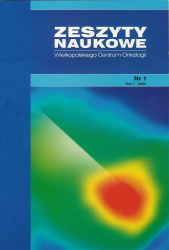Abstract
Prostate cancer is one of the most frequent diagnosed cancer in men in devoloped countries. So, the crucial point for achiving the best results of therapy is chosing optimal treatment for particular patient. The appriopriate treatment decision process is challenging for all specialists involved in this process such as urologists, radiation oncologists, and clinical oncologists. Prostate cancer treatment with radiotherapy during the scientific conferences such as ASTRO and ESTRO was one of significant part of scientific disscusion regarding reults of the most important clinical studies evaluated the role of radiotherapy. One of the most important conclusion from recently presented trials for intermediate and high-risk prostate cancer patients stated that combined treatment encompassed androgen deprivation therapy and modern high-dose radiotherapy gives the best results in comparison to high-dose or moderate dose radiotherapy alone. Another very important groups of trials concerned the role of dose escalation for patients with prostate cancer and all studies clearly showed that dose escalation is related with significant clinical benefit, but still it is some concerns regarding translation of biochemical gain into overal survival benefit especially when the follow-up period is relatively short.
References
Krajowy Rejestr Nowotworów- Gruczoł krokowy. http://onkologia.org.pl/rak-gruczolu-krokowego/.
Global Cancer Observatory, Globocan 2018; https://gco.iarc.fr/today/home.
Ricco A, Manahan G, Lanciano R. The Comparison of Stereotactic Body Radiation Therapy and Intensity-Modulated Radiation Therapy for Prostate Cancer by NCCN Risk Groups. Front Oncol 2016; 6:184.
Głowacki G, Bodusz D, Majewski W. Frakcjonowana radioterapia stereotaktyczna CyberKnifeTM chorych na raka gruczołu krokowego. Oncol 2012;62: 274–282.
King C. Lehmann J. Adler J. Hai J. CyberKnife Radiotherapy for Localized Prostate Cancer: Rationale and Technical Feasibility. Technol Ca Res Treat 2003; 2: 25-29.
Akaza H, Homma Y, Okada K i wsp: A prospective and randomized study of primary hormonal therapy for patients with localized or locally advanced prostate cancer unsuitable for radical prostatectomy: results of the 5-year follow-up. BJU Int 2003; 91: 33–6.
Alcaraz A, Teillac P. Hormone therapy for prostate cancer: Guidelines versus Clinical Practice. Eur Urol 2006; 362–8.
Amant RS, Dunscombe PB, Roberts GH. A cost – outcome analysis of long-term adjuvant goserelin in addition to radiotherapy for locally advanced prostate cancer. Urol Oncol 2003; 21: 171–7.
Zapatero A, Guerrero A, Maldonado X i wsp. Late Radiation and Cardiovascular Adverse Effects After Androgen Deprivation and High-Dose Radiation Therapy in Prostate Cancer: Results From the DART 01/05 Randomized Phase 3 Trial. Int J Radiat Oncol Biol Phys 2016;96:341-348.
Bolla M, van Poppel H, Collette L i wsp. European Organization for Research and Treatment of Cancer. Postoperative radiotherapy after radical prostatectomy: a randomized controlled trial (EORTC trial 22911). Lancet 2005; 366: 572–78.
Crook J, Ludgate C, Malone S i wsp. Report of a multicenter Canadian phase III randomized trial of 3 months vs. 8 months neoadjuvant androgen deprivation before standard-dose radiotherapy for clinically localized prostate cancer. Int J Radiat Oncol Biol Phys 2004; 60: 15–23.
D’Amico AV, Manola J, Loffredo M i wsp. 6-month androgen suppression plus radiation therapy vs radiation therapy alone for patients with clinically localized prostate cancer: A randomized controlled trial. JAMA 2004; 292: 821–27.
Dearnaley DP, Hall E, Lawrence D i wsp. Phase III pilot study of dose escalation using conformal radiotherapy in prostate cancer: PSA control and side effects. Br J Cancer 2005: 92: 488–98.
Milecki P: Radioterapia skojarzona z hormonoterapią u chorych z rakiem gruczołu krokowego: nadal więcej pytań niż odpowiedzi. Przegl Lekarski 2005; 62: 1455–9.
Sanguineti G, Marcerano M, Franzone P i wsp: Neoadjuvant androgen deprivation and prostate gland shrinkage during conformal radiotherapy. Radiother Oncol 2003; 66: 151–7.
Valicenti KR, Winter K, Cox JD i wsp: RTOG 9406: is the addition of neoadjuvant hormonal therapy to dose-escalated 3D conformal radiation therapy for prostate cancer associated with treatment toxicity? Int J Radiat Oncol Biol Phys 2003;57:614–20.
Samper PM, López Carrizosa C, Pérez Casas A i wsp. Impact of neoadjuvant hormonal therapy on dose-volume histograms in patients with localized prostate cancer under radical radiation therapy. Clin Trans Oncol 2006;8:599–605.
Ozyigit G, Akyol F, Onal C i wsp. Combined hormonotherapy and definitive radiation therapy in localized prostate adenocarcinoma. Inter Hematol and Oncol 2003;13:177–89.
Michalski JM, Moughan J, Purdy J i wsp. Effect of Standard vs Dose-Escalated Radiation Therapy for Patients With Intermediate-Risk Prostate Cancer: The NRG Oncology RTOG 0126 Randomized Clinical Trial. JAMA Oncol 2018 14;4.
